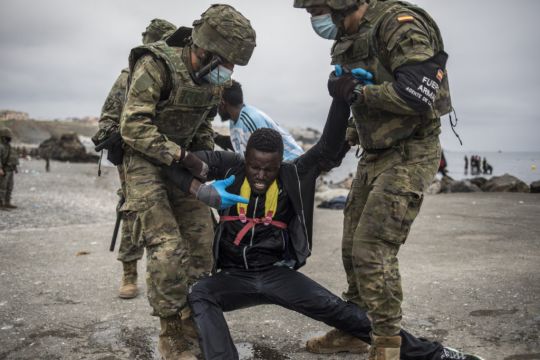Spain has deployed its military to the Moroccan border after thousands of Moroccans took advantage of their government’s relaxed border controls to swim or paddle in inflatable boats onto European soil.
Live footage on Spain’s public broadcaster TVE showed dramatic scenes of soldiers carrying children in their arms and Red Cross personnel helping migrants who were emerging from the water exhausted and cold.
The sudden influx of migrants has deepened the diplomatic spat between Rabat and Madrid and created a humanitarian crisis for Ceuta, the Spanish city of 85,000 that lies in North Africa on the Mediterranean Sea, separated from Morocco by a fence.

Prime Minister Pedro Sanchez cancelled a trip to Paris, where he was to attend a summit on international aid to Africa, and flew by helicopter to Cueta.
While calling Morocco a “friend of Spain” Mr Sanchez also urged authorities to “respect the shared border”.
By Tuesday morning, at least 7,000 people had crossed the border into Ceuta since the first arrivals began early on Monday, the Spanish government said, including 1,500 thought to be teenagers. The number getting in appeared to have slowed but did not stop on Tuesday as Spain deployed additional police and soldiers to the border.
One young man drowned on Monday and dozens have been treated for hypothermia. The arriving adults were being transferred to Ceuta’s main football stadium as they waited to be returned back to Morocco while those thought to be minors were sent to warehouses run by the Red Cross and other groups.
Several military armoured vehicles parked at Tarajal beach in Ceuta, where the border fence leads to a short breakwater extending into the sea.
In a video shared by a Spanish police union urging authorities to provide more reinforcements, anti-riot officers behind the border fence were using shields to protect themselves from stones being thrown by people in Morocco.

Interior minister Fernando Grande-Marlaska said authorities had processed the return of 2,700 migrants by midday on Tuesday and that the rest would follow soon because Morocco and Spain signed an agreement three decades ago to return all those who swim into the territory.
It was unclear if that applied to unaccompanied migrants under 18, who are usually allowed to remain legally under the tutelage of Spanish authorities.
The European Union’s top migration official – home affairs commissioner Ylva Johansson – described the incidents as “worrying” and she called on Morocco to prevent people from setting out in the first place.
“The most important thing now is that Morocco continues to commit to prevent irregular departures, and that those who do not have the right to stay are orderly and effectively returned,” Ms Johansson told members of the European Parliament.
“Spanish borders are European borders. The European Union wants to build a relationship with Morocco based on trust and shared commitments. Migration is a key element in this,” she said.







